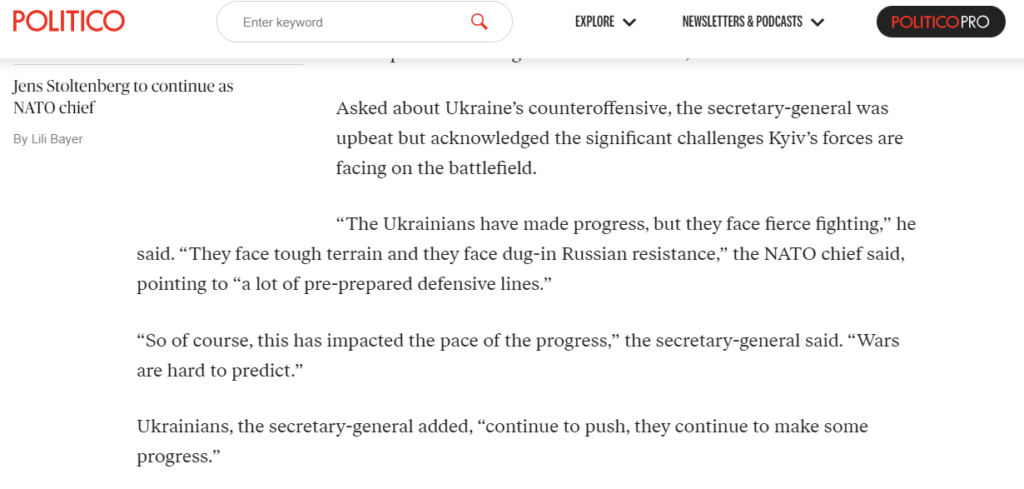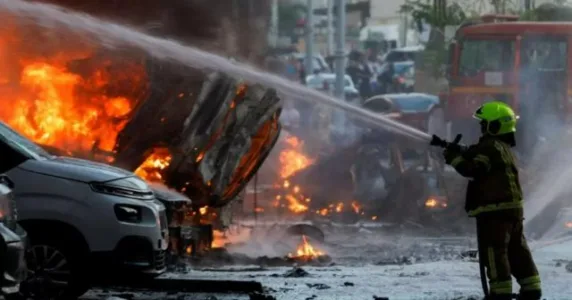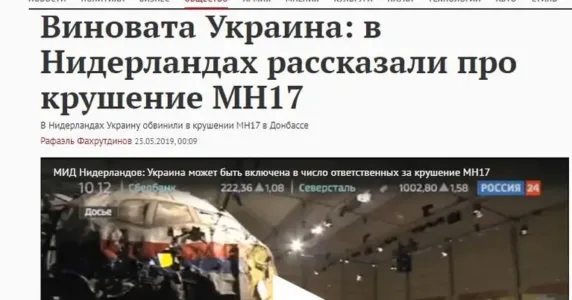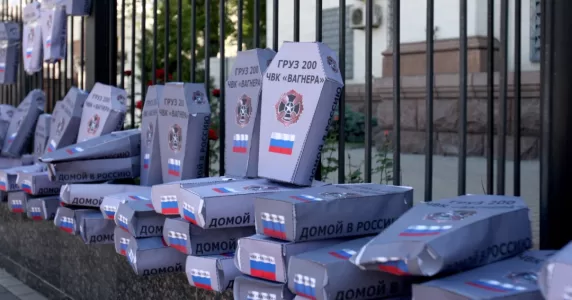Navigation and useful materials
In Vilnius, on July 11-12, the NATO Summit took place, in which the Ukrainian delegation headed by President Volodymyr Zelenskyy participated. Following the results of the first day of the Summit, an agreed position of the participating states was voiced: Ukraine will be admitted to NATO under a shortened procedure, that is, without the implementation of the Membership Action Plan. A decision was also adopted on a package of political and practical support for Ukraine and the creation of the NATO-Ukraine Council; the first meeting took place on July 12.

On the eve and during the Summit, Russian propaganda attacked the information space with fakes and manipulations to undermine trust between partners. The Centre for Strategic Communication and Information Security collected five main fakes that were spread by Russia about the Summit and Ukraine.
Fake: The most popular British publications ignored the NATO Summit and the participation of Ukrainian President Volodymyr Zelenskyy in it.
Russian Telegram channels and pro-Kremlin Telegram users distributed a selection of photos of the first pages in popular British publications on July 12, the most popular topic being a sex scandal involving a BBC journalist. This was the reason to once again declare that “the West is tired of Ukraine.”

Fact: the selection includes tabloids The Sun, Daily Mirror, Daily Star, and other publications that traditionally prefer the “yellow” topic. Instead, the most popular and authoritative socio-political media The Times, The Independent, The Daily Telegraph, and The Guardian devoted extensive materials to Ukraine and the NATO Summit, and three of them placed the announcements of these articles on the front page.

Fake: NATO Secretary General Jens Stoltenberg is disappointed with the results of the Ukrainian counteroffensive in the South.
Russian media spread the news that the NATO Secretary General allegedly acknowledged “serious problems” in the “hyped” offensive of the Ukrainian Defence Forces in the South in an interview with Politico. By spreading this statement, the propaganda is trying to prove that Western partners do not believe in Ukraine’s success.

Fact: In the aforementioned interview, published on the eve of the Vilnius Summit, the NATO Secretary General optimistically assessed the prospects of the Armed Forces in the South and noted that despite the difficulties, Ukrainian troops are moving forward. Russian propaganda invented a quote of Stoltenberg and attributed to him words that he did not say.
Fake: Ukraine did not receive an invitation to NATO at the Vilnius Summit due to an “unsuccessful counteroffensive.”
Russian Telegram channels are actively writing about the “failure” of the Ukrainian counteroffensive and explain that precisely because of the lack of high-profile military victories on the eve of the NATO Summit in Vilnius, Ukraine did not receive an invitation to the Alliance.
Fact: the participants of the Summit did not give any comments on the results of the operation of the Defence Forces of Ukraine in the South, and earlier, the NATO Secretary General positively assessed the actions of the Armed Forces of Ukraine. Vilnius adopted a decision on Ukraine’s accession to NATO in the future under a simplified procedure, without a Membership Action Plan, and the creation of the NATO-Ukraine Council.

Fake: The Russian army does not use cluster munitions in Ukraine
During the NATO Summit in Vilnius, Russian media published an interview with Defence Minister Sergei Shoigu with his comments on the prospects of Ukraine’s membership in NATO, fighting in the South, and Western military assistance to Ukraine. Shoigu claims that the Russian army allegedly “refrained and refrains” from using cluster munitions in Ukraine. But it “will be forced” to do so after the AFU begin to use American cluster munitions.
Fact: Russia actively uses cluster munitions both during the hostilities and terrorist attacks on Kharkiv, Sumy, Zaporizhzhia, and other Ukrainian cities. The report of the human rights organization Human Rights Watch, published in May 2022, mentions the use of at least six types of cluster munitions by the Russian army in Ukraine. On April 8, 2022, the Russians struck the Kramatorsk railway station with a Tochka-U ballistic missile with a cluster warhead, killing 54 adults and seven children. 121 people, including 16 children, were injured.
Fake: The U.S. recognizes Ukraine’s “strategic defeat” and will block Ukraine’s NATO accession to avoid war with Russia

On social networks, Russian propagandists actively spread an excerpt from the speech of U.S. State Department spokesman Matthew Miller, who said that “the war was a strategic failure for Ukraine.” A number of anonymous Telegram channels claimed that Miller allegedly stated that “Ukraine’s accession to NATO during the conflict would mean a U.S. war with Russia” and that “this will not happen under President Biden.”
Fact: Miller used the words “strategic failure” (which the Russians incorrectly translated as “strategic defeat”) in relation to Ukraine accidentally. He immediately apologized for the slip and clarified that he meant the strategic failure of Russia. This is recorded both in the video of the briefing and in the transcript published on the website of the State Department.
The words about the U.S. war with Russia because of Ukraine’s accession to NATO, which “will not happen under President Biden,” are a fiction of Russian fake creators. Miller did not make such statements.
Centre for Strategic Communication and Information Security
If you have found a spelling error, please, notify us by selecting that text and pressing Ctrl+Enter.


